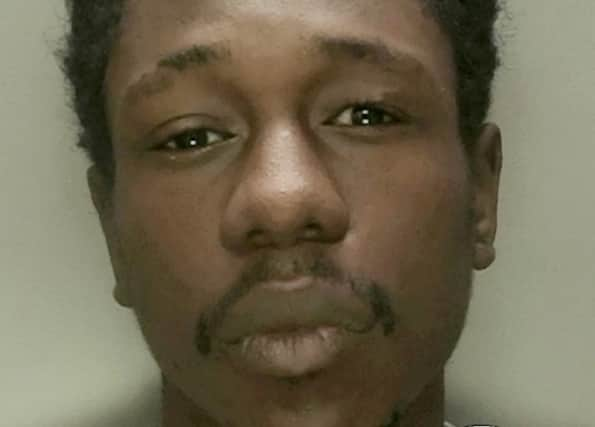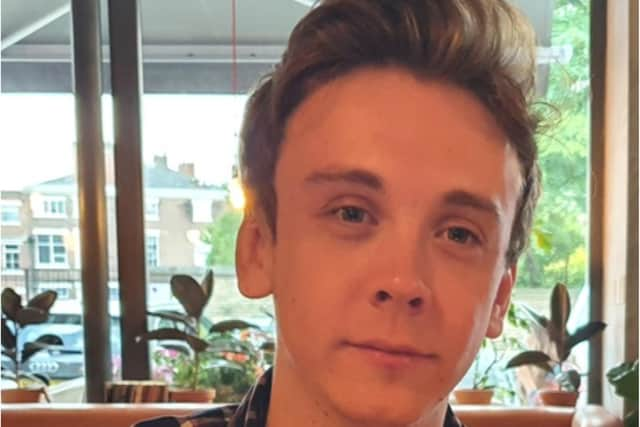Birmingham stabbings: paranoid schizophrenic killer was released from prison with no support months before rampage in the city centre


A paranoid schizophrenic was released from prison into the community with no support just months before he went on a stabbing spree in a city centre, a court heard.
Zephaniah McLeod, 28, killed a university worker and left seven other people injured when he went on a knife rampage across Birmingham on September 6 last year.
Advertisement
Hide AdAdvertisement
Hide AdJacob Billington, 23, of Crosby, Merseyside, died after McLeod plunged a blade into his neck as he walked back to his hotel with friends following a night out.
His pal Michael Callaghan, 23, was also seriously injured as were six other revellers during the string of violent random stabbings.
McLeod previously pleaded guilty to manslaughter on the grounds of diminished responsibility, four counts of attempted murder and three charges of wounding.
Killer will require lifelong treatment, court hears
On the second day of his sentencing hearing, a psychiatrist said McLeod will require lifelong treatment and would be a danger to others if he was sent back to jail.
Advertisement
Hide AdAdvertisement
Hide AdDr Jeremy Kenney-Herbert described the defendant as a "very dangerous man" who could pose a further threat to staff and other inmates in prison.
He said McLeod said he had no recollection of any events from July to September last year and recommended detention under the Mental Heath Act.


Why was the killer released with no supervision or support?
Defence barrister Michael Burrows QC, asked why McLeod was released from prison in the middle of the pandemic in April 2020, with no supervision or support.
Dr Kenney-Herbert replied: “In April 2020, in an ideal world someone like this would be close to their home so that they were close to mental health services.
Advertisement
Hide AdAdvertisement
Hide Ad“Basically, housing and supervision. Without that support is it likely he would become mentally ill.
"He had little medication, little money, very little other support or supervision
"I understand that he had gone to the very end of his sentence and no conditions were placed on his discharge.
"Without that support, and not registering with a GP, it is likely to lead to a relapse of his mental illness.
Advertisement
Hide AdAdvertisement
Hide Ad“Clearly at some point he realised he needed help and registered with a surgery. A GP referred him to local mental health service.
“He was quite concerned about his mental state. It was too late - he didn’t know what to do to comply or engage, that is my hypothesis.
"He was suffering from a severe mental illness.
"It’s my opinion that his horrific behaviour and the offences that have been committed is highly attributable to his mental illness."
Dr Kenney-Herbert also said at the time of the offence, McLeod, who has a string of previous convictions, was using more cannabis, crack cocaine and alcohol than usual.
Advertisement
Hide AdAdvertisement
Hide AdHe told Birmingham Crown Court: "He couldn’t explain why he had no memory.
"He said he recalled seeing dark skies and stars".
Dr Kenney-Herbert said would need supervision for the rest of his life and was currently in the early stages of receiving treatment.
He added: “It is still at a very early stage.
"I can’t put a time frame on when he is free of symptoms - he isn’t free now but improved. He will need treatment for the rest of his life, in my opinion.
“When I look at this case, with his previous gang affiliation and having weapons, based on all the information and interviewing him, it is my opinion is that was highly attributed to his untreated mental illness.
Advertisement
Hide AdAdvertisement
Hide Ad“Everything must be done to keep his schizophrenia treated, under control and monitored - a Section 37 hospital order provides a mechanism to do that.
“If he returns to prison, the mental health act doesn’t apply, the supervision in prison is quite difficult - based on his past behaviour, he will stop medication.”
McLeod told nurse he heard voices in his head telling him to kill
Dr Kenney-Herbert said there had been a "pattern" of refusal to take anti-psychotic medication and missed appointments with mental health professionals.
As late as September 3, three days before the attacks in Birmingham, he was seen by a mental health nurse, and said he had heard "distressing" voices in his head.
A few years earlier he spoke of having "dark and sinister thoughts about killing" and heard voices in his head saying: "Kill ‘em, stab ‘em".
The sentencing hearing continues.